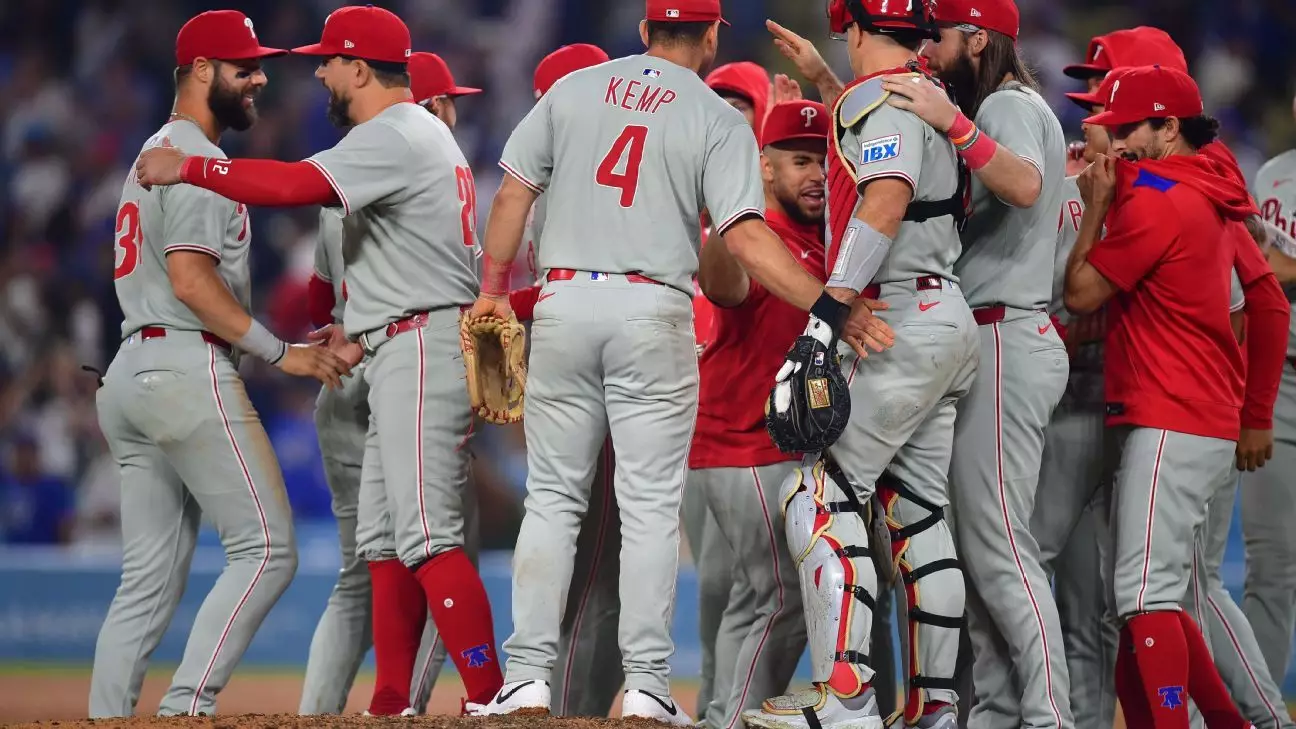The recent celebrations by the Philadelphia Phillies—champagne pouring, beer chugging from hoses, and cigar puffing—serve as a vivid testament to the highs of victory. Yet, beneath this boisterous exterior lies a team grappling with larger systemic issues that threaten to undermine their historic ambitions. These exuberant moments are not just about celebrating temporary success but also expose the fragility of the franchise’s foundation. Are these celebrations a sign of genuine resilience or merely an elaborate distraction from persistent underlying problems?
While the Phillies revel in their division title, their so-called resilience raises questions about sustainability. Such victories, often celebrated with dramatic flair, tend to overlook the real struggles teams face beyond the limelight: injuries, inconsistent performances, and strategic shortcomings. When Kyle Schwarber’s heroics and Harper’s timely homers dominate the narrative, they obscure the fact that this team got here despite significant adversity—injuries to key players, a lackluster start, and a perilous dependence on late-game heroics. Is this truly resilience, or merely a fortunate convergence of streaks that could vanish in the blink of an eye?
The jubilant scene in the Dodgers’ stadium—while energizing—can encourage complacency. It’s crucial to recognize that celebrations at this stage are premature masking of vulnerabilities that could be exploited by more disciplined contenders as the postseason approaches. Resilience isn’t just about rallying late or clinching a division; it’s about forging a team capable of weathering storms well beyond the regular season. Relying on last-minute heroics and individual heroics may breed overconfidence, an attitude that can lead to downfall.
Overcoming Adversity: The Illusion of Strength or Genuine Grit?
The Phillies’ journey this season exemplifies the blurred line between tactical resilience and structural instability. Losing ace Zack Wheeler mid-season due to health issues could have been a defining catastrophe. Instead, the team’s depth—bolstered by strategic trades—carried the day. Yet, this isn’t the mark of a robust system but rather a band-aid over deeper vulnerabilities. The reliance on mid-season acquisitions like Bader and Duran underscores a team desperately patching holes, risking a fragile stability that might crumble under postseason pressure.
Despite the commendable effort to maintain a competitive edge, the underlying challenges—such as star shortstop Trea Turner and third baseman Alec Bohm battling injuries—highlight how little room for error this roster truly has. These are not mere setbacks but symptomatic of a broader fragility within the team’s infrastructure. If the Phillies were truly resilient, they would embody a more balanced and injury-proof symphony rather than depending so heavily on a handful of stars and clutch moments.
The narrative of resilience is often riddled with superficial bravado, but the reality requires sober acknowledgment: true strength is measured by consistency, not just the ability to bounce back from adversity. The Phillies’ recent success may be more an illusion of adaptability than a reflection of long-term durability. As they edge closer to October, overconfidence could blind them to systemic flaws that more disciplined foes like the Dodgers—or even a resurgent Mets—would exploit.
The Illusion of Power: Celebration as a Distraction
Celebrating a division title in such a flamboyant manner—champagne, cigars, and victory poses—may feel invigorating, but it also runs the risk of fostering complacency. While the team’s newfound swagger demonstrates confidence, it could be a cover-up for internal doubts about their readiness for the ultimate challenge. These celebrations are distractions from the tough truth: sustained success in baseball demands more than emotional highs—it requires meticulous strategy, injury management, and adaptability.
The Phillies’ rapid rise through the ranks might inspire some to see them as a formidable force, but their story is more of an ongoing rebuild that is still vulnerable to its own cracks. Big wins and loud celebrations often shift focus away from the real questions: can this team maintain consistency? Can their bullpen hold up when it matters most? Will their star players stay healthy and engaged, or will injuries and fatigue derail their postseason ambitions?
The question remains whether this team truly has the grit to push onward or if they are merely skating on borrowed time. History teaches us that teams built on flair and fleeting moments of brilliance are often the first to stumble when faced with adversity in its rawest form. If the Phillies want to avoid the pitfalls of overconfidence, they must temper their celebrations with humility and realism.
The Future of the Phillies: Hope or Overconfidence?
The Phillies are riding a wave of momentum, but this momentum might be more fragile than they realize. Their recent surge, while impressive, appears too reliant on late-game heroics and individual brilliance rather than cohesive, systemic strength. The franchise’s history shows flashes of greatness, often followed by swift declines when overconfidence takes hold.
What needs to be questioned most is whether Philadelphia’s management and fans are prepared for the realities of postseason pressure. The team’s resilience could be tested to the extreme if injuries strike again or if their bullpen falters under the weight of expectations. The current exuberance, while justified in the short term, must be tempered with strategic foresight. Overestimating their current form risks leading to the same disappointments that have haunted previous Phillies teams.
The narrative surrounding the Phillies’ success must shift from celebration to critical evaluation. True resilience isn’t about how loudly a team cheers in victory; it’s about how well they prepare for inevitable setbacks, how unified they remain when adversity strikes, and how wisely they build for sustained excellence. As they clinch a division title with remarkable speed, the challenge becomes whether they can translate that momentum into postseason dominance—or if the celebration itself might prove to be the quiet prelude to another fall.

